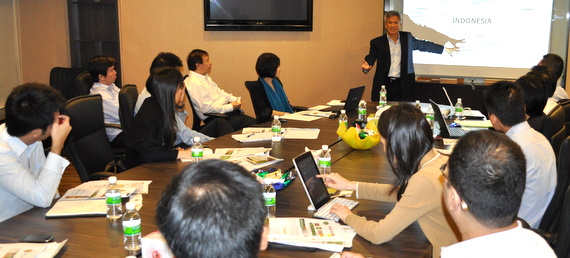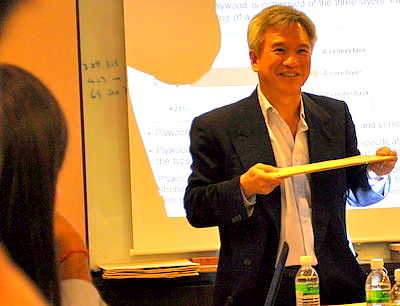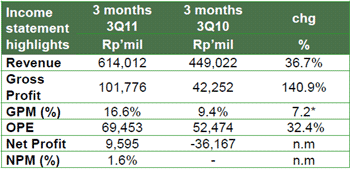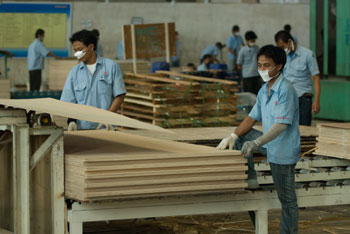
AFTER THREE YEARS of losses, Samko Timber looks set to record a profit for this year. Samko is in the midst of transforming from being a low-margin plywood manufacturer into one with new high-margin products, a rapidly growing retail network and new synergistic business.
At a briefing for analysts last week, CEO Aris Sunarko gave an overview of the transformation and the future growth drivers of the business.
Though a traditional plywood producer, it has been devoting resources to R&D, and there are new products that will be unveiled in the near future.
“We allocate funds to R&D even in difficult times and it is our strong R&D that enables us to have a 5-year horizon for our product pipeline," said Mr Sunarko.
As an example of the innovation that has sprung out of its R&D efforts, he said: “We are the first company to turn the Sengon tree into plywood. We designed the equipment and had it machined by external parties. The yield from Sengon is higher than big trees, and our R&D engineers developed the machine for producing plywood with high efficiency from small logs,” he said.
The Sengon tree is a fast-growing species that takes 5 to 6 years to grow to diameters of 20 cm to 30 cm. In comparison, it takes 15 to 30 years before softwood and hardwood trees can be harvested.

Sustainable logging supply
Samko has a unique social program with smallholders on the main Indonesian island of Java by providing income to those who use their backyard to plant trees.
It costs the farmer just 20 cents to plant one Sengon tree and this is harvested and purchased by Samko at US$35 after five to six years.
As you can imagine, the scheme is so popular that almost every household in the communities of forest clusters on Java participates in it.
For Samko, this is a sustainable log supply ungoverned by forestry regulators.
As one of the world’s leading manufacturers of tropical hardwood plywood, practices that promote sustainability to the environment are directly related to the sustainability of Samko’s business continuity.
“The world demands plantation wood and we have a sustainable supply,” said Mr Sunarko.
The smallholders incentive program has enabled Samko to drop its 100% dependence on natural forest logs in 2003 to only 15% currently.
For every tree that is logged, Samko makes sure it provides seedlings to plantation farmers for replanting.
It now buys 40% of the plantation logs in Java, is the price leader there and the preferred brand in the country.
”We are confident that plantation farmers prefer to supply to us because of our social programs. For example, we provide agricultural training programs as well as personal incentives for the top growers such as hand phones,” he explained.
Satellite factories close to the market place

Another beautiful thing about its social program that provides smallholders with income is that it now has satellite factories on the main Indonesian island of Java, where the market place is.
What this means is a more competitive cost of transport, less working capital requirements and less risk of selling price fluctuation. It has even improved log yield.
Most plywood factories are located in the forests in Sumatra and Kalimantan but being in Java allows Samko to deliver its plywood products to wholesalers via trucks instead of by shipping.
Relieved of the burden of accumulating enough plywood orders to fill one container for shipment to another island, it maintains low inventories and thus requires less working capital.
Other than lower transportation costs, delivery via trucks takes one only 3 to 4 days, and this minimizes market risk of plywood price fluctuation.
Having satellite factories close to log supply also increases log yield, because unlike wood that has been cut for several weeks, freshly cut wood does not face problems like drying, cracking or blue stains.

Stepping up its retail presence
Samko wants to extend its capabilities along the timber supply chain and is targeting to have 100 retail stores for its plywood products in 3 years, up from 20 stores currently.
Bypassing the wholesaler works out to about 1.5% to 2% of margin expansion, according to the CEO.
"We are targeting to sell 60% of our products through our own retail stores and we hope to eventually have a platform carrying building products from other manufacturers," he said.
Downstream products with better margins
To complete the supply chain, the plywood maker wants to expand its product range. It will soon launch the following three new products on a large scale.
(1) Eco-friendly trucks. Samko has 75% of Japan’s market for wood used to manufacture the body of eco-friendly trucks. Export sales to Japan was a major contributor to its 37% year-on-year surge in its consolidated revenues for 3Q2011.
(2) Water-proof wood taken from rubber trees that substitutes natural exotic wood used in the outdoors.
(3) House components. Mr Sunarko sees very strong timber demand for housing coming from Indonesia, China and India.
We look forward to insights into the huge market for Samko Timber’s exciting pipeline of eco-friendly products that are going to expand group margins.
Related stories:
SAMKO's 3rd profitable Q, TECHNICS' insiders buy, TREK affected by floods
SAMKO TIMBER: Stock Is A 3-Bagger Since Japan Earthquake







